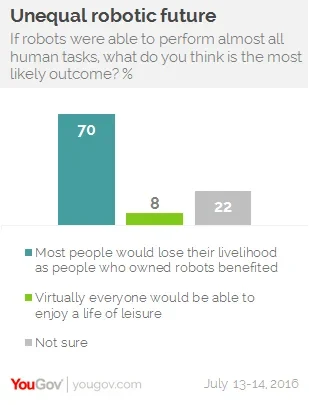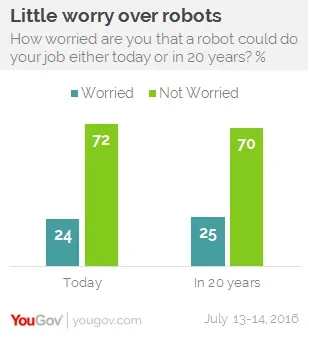A new survey from YouGov Omnibus shows that 70% of people think a futuristic robotic workforce will lead to mass inequality
Visions of a utopic society, where robots do all the work while humans enjoy all the leisure, have largely come and gone. Today, research suggests that more than five million jobs will be lost by 2020 due to "developments in genetics, artificial intelligence, robotics and other technological change," writes Bloomberg. And those jobs aren't coming back. Even Elon Musk, the tech-forward genius behind Tesla and SpaceX, has expressed strong concerns about advanced AI one day destroying humanity outright, and donated millions of dollars to help prevent that from happening.

According to a new data from YouGov Omnibus, 83% of the public thinks it's likely that robots will eventually be able to do many of the tasks humans currently do, and yet the vast majority think this scenario won't be good for the average person: 70% believe most people will lose their livelihood, as the robot owners grow incredibly wealthy. Only 8% still hold onto the optimistic view that a robotic workforce will allow everyone abundant free time to pursue their passions and hobbies.
At the same time, however, most people aren't concerned about being replaced by a robot anytime soon — or even 20 years down the road. Indeed, the YouGov Omnibus survey reveals that around 70% say they're either not very worried or not at all worried about becoming obsolete at their place of work. So, it seems while most agree that robots are coming to take their jobs, they don't think this will occur in their lifetime.

Additional numbers from YouGov Profiles, which both collects and connects a vast range of data on people's attitudes and behaviors, shows that 60% of people think artificial intelligence will eventually help humans with most of their daily tasks.
That said, an even greater percentage (71%) believe we have to pay close attention to the development of AI so that it never gets out of hand.
For full poll results and margin of error see here.








